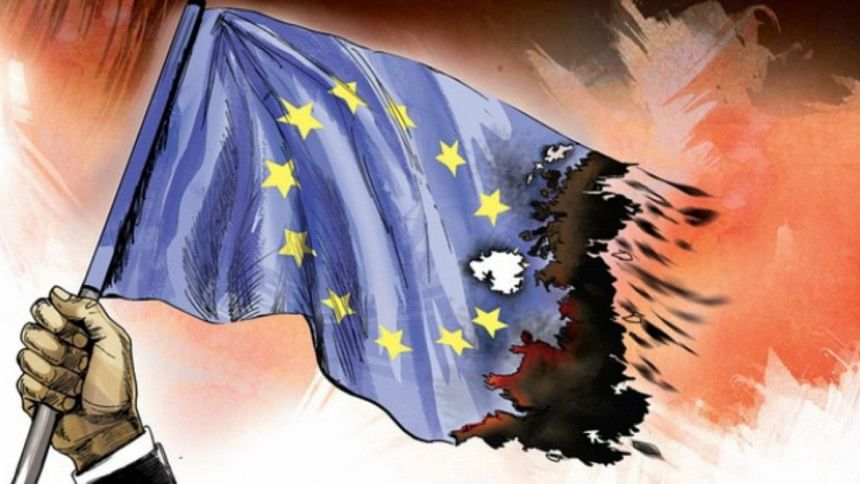Europe's leadership crisis

The European Union's list of crises keeps growing. But, beyond the United Kingdom's "Brexit" vote to leave the bloc, Poland's constitutional-court imbroglio, Russian expansionism, migrants and refugees, and resurgent nationalism, the greatest threat to the EU comes from within: a crisis of political leadership is paralysing its institutions.
As if to prove the point, EU member states' leaders (with the exception of UK Prime Minister Theresa May) met recently in Bratislava, Slovakia, in an attempt to demonstrate solidarity, and to kick-start the post-Brexit reform process. The attendees made some progress toward creating a European Defense Union, which should be welcomed, and toward admitting that the EU's current organisational framework is unsustainable; but there was scant talk of meaningful institutional or economic reform.
Meanwhile, Italian Prime Minister Matteo Renzi's refusal, at the close of the summit, to appear onstage with French President François Hollande and German Chancellor Angela Merkel all but confirmed fears that rudderless leadership is fueling institutional dysfunction. A summit that was supposed to be a display of unity revealed only further division.
EU leaders must take responsibility for this latest failure. For starters, they must stop issuing empty declarations. The EU's institutional impotence is apparent, especially to its enemies. So now it faces a stark choice: a leap forward toward unification or inevitable disintegration.
Few Europeans want to make that choice. Many politicians are afraid of paying a high domestic political price for pursuing an agenda of EU reform. They argue that pushing for further integration in the current political climate is reckless, and that the EU should focus on doing less, better.
But that is a false trade-off. The EU could build a more integrated economic-governance model to increase investment and create jobs, while at the same time streamlining its operations to address common complaints about red tape and dysfunction.
Few European leaders seem to understand that the real risk to the EU – and to their own political futures – is the status quo. And with populist movements across Europe pummeling traditional parties in the polls, the window for delivering real change is quickly closing.
It does not have to be this way. Too many leaders are paying lip service to domestic nationalists and populists, mistakenly thinking that this will preserve their domestic poll ratings, when they should be showing genuine leadership and fighting for the common good.
Upcoming national elections in France and Germany will be bellwethers for the future of European leadership. In recent German state elections, Merkel's Christian Democratic Union and its government partner, the Social Democratic Party, experienced notable losses, which could mean that Germany's grand coalition is at risk ahead of next year's election. Meanwhile, support for the far-right Alternative for Germany (AfD) continues to grow.
Merkel has two choices: She can move to the right, as former French President Nicolas Sarkozy has done in his latest bid for the French presidency, or she can fight to hold the centre by addressing the AfD's simplistic arguments head on. The choice is clear: Merkel should stand and fight, while also advancing an alternative vision for modernising the EU.
Defeating populism will require leaders to acknowledge the people left behind as a result of globalisation, but also to dispel the myth that there is a quick fix, or that globalisation can simply be reversed. Contrary to populist arguments, protectionism will not reduce youth unemployment or income inequality. If EU countries reject trade deals currently under discussion, including the Transatlantic Trade and Investment Partnership and the Comprehensive Economic and Trade Agreement, the EU's share of world trade will decrease, and the European economy will suffer for it.
Likewise, if the eurozone fails to integrate further by strengthening its economic-governance structures, Europe's ongoing financial crisis will only continue, impeding social mobility and undermining social justice. It is time for EU leaders to make these arguments more effectively.
Across the West, the 2008 financial crisis triggered a political fight that is still in progress. It has changed from a battle for accountability and reform to a clash between visions of open and closed societies, between a global consensus and policies still operating at the national, local, or even tribal level.
If the EU is going to quell the revolt against globalisation, free trade, and open societies, it will need more leaders and fewer managers. European leaders, frankly, should know better than to blame EU institutions, hypothetical trade deals, and refugees for their own failures to tackle unemployment and reduce inequality.
The EU's current crisis-management playbook is running out of pages. We in Europe can either put our heads in the sand while the European project slowly dies, or we can use this crisis to start a new project of renewal and reform.
Here, too, the right choice is clear: EU leaders should offer Europeans a new social contract, based on the understanding that people's legitimate fears about globalisation should be met with a collective, progressive European response.
The EU has been a major force behind globalisation, and only the EU has the power to help manage the consequences. European leaders must explain to their voters why nationalism cannot.
The writer, a former Belgian prime minister, is President of the Alliance of Liberals and Democrats for Europe Group (ALDE) in the European Parliament.
Copyright: Project Syndicate, 2016.
www.project-syndicate.org
(Exclusive to The Daily Star)

 For all latest news, follow The Daily Star's Google News channel.
For all latest news, follow The Daily Star's Google News channel. 



Comments